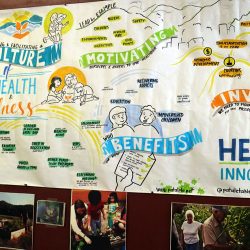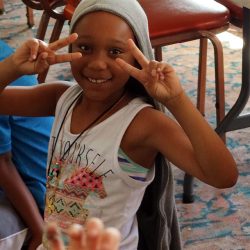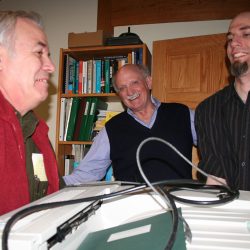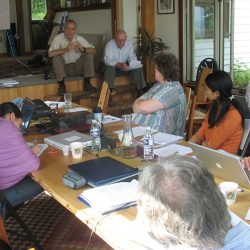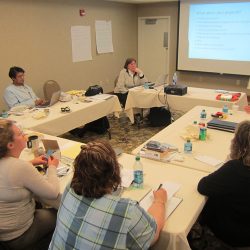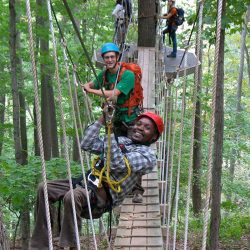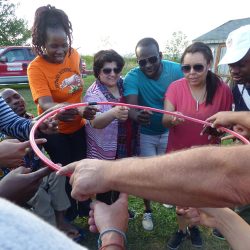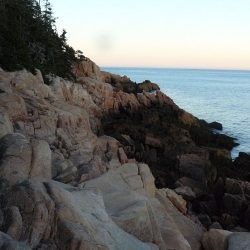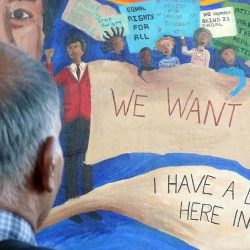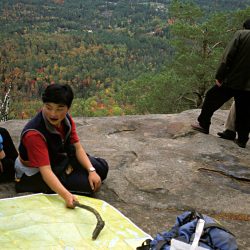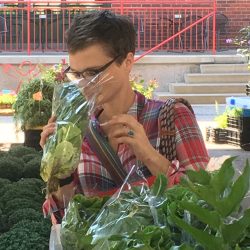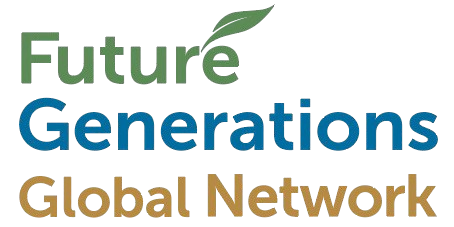Future Generations USA - An Overview
 Future Generations University promotes research, learning and action to achieve inclusive and sustainable change worldwide. Future Generations University was founded in 2003 with the goal of increasing the effectiveness of community change practitioners around the world. The university grew out of and is one among now a quarter-century old global family of Future Generations organizations. They grew out of a UNICEF-sponsored study of successful community change work and the evolution of SEED-SCALE, a process for facilitating change based on resources all communities have access to advancing change that can begin now. The Masters degree and certificates the university offers build skills and capacity especially targeted to mid-career community leaders. We have trained community leaders now from 40 countries. Future Generations University is headquartered in Franklin, West Virginia, USA, and reaches especially to similar rural communities around the world.
Future Generations University promotes research, learning and action to achieve inclusive and sustainable change worldwide. Future Generations University was founded in 2003 with the goal of increasing the effectiveness of community change practitioners around the world. The university grew out of and is one among now a quarter-century old global family of Future Generations organizations. They grew out of a UNICEF-sponsored study of successful community change work and the evolution of SEED-SCALE, a process for facilitating change based on resources all communities have access to advancing change that can begin now. The Masters degree and certificates the university offers build skills and capacity especially targeted to mid-career community leaders. We have trained community leaders now from 40 countries. Future Generations University is headquartered in Franklin, West Virginia, USA, and reaches especially to similar rural communities around the world.
Strength In Peers – Sister Organization
Strength in Peers believes community members can help one another access services and advocate for changes that better meet their needs. Our organization’s mission is to close gaps in services using community engagement and peer-to-peer approaches.
 Strength In Peers is a nonprofit organization of people who have lived-experience recovering from mental health challenges and/or substance abuse. We strive to empower individuals during recovery by offering services that encourage connection, access to resources and self-sufficiency.
Strength In Peers is a nonprofit organization of people who have lived-experience recovering from mental health challenges and/or substance abuse. We strive to empower individuals during recovery by offering services that encourage connection, access to resources and self-sufficiency.
West Virginia Broadband Opportunities Program
With a $4.4 million grant from the American Recovery and Reinvestment Act through the Broadband Technology Opportunities Program, Future Generations partnered with 60 volunteer fire departments to set up public computer and learning centers.
 Fire department volunteers, with the support of a local person trained as a computer mentor, manage these broadband learning centers, offer training in basic computer skills, and keep the centers open for a minimum of ten hours per week. In addition, the project refurbishes and sells low-cost desktops and laptops.
Fire department volunteers, with the support of a local person trained as a computer mentor, manage these broadband learning centers, offer training in basic computer skills, and keep the centers open for a minimum of ten hours per week. In addition, the project refurbishes and sells low-cost desktops and laptops.
Sixy fire departments are confirmed partners, with the majority located in West Virginia’s southern coalfields. Additionally, the organization has trained 150 computer mentors from these communities.
Other educational partners include the Monongahela National Forest (online mapping); Partnership of African American Churches (chronic disease self-management with online support groups and Project Alert, a substance-abuse awareness program for youth); Johns Hopkins University (disaster resilience), Adult Basic Education, community and technical colleges, and Mission WV (digital literacy and e-commerce academy).
To better understand the data and evidence of the digital divide, Future Generations trained a team of eight community interviewers to conduct 780 door-to-door household surveys of computer and broadband use in 26 communities. Although 67% of households in program areas own a functioning computer, only 49% have access to broadband, with 21% using the resource to continue their education and 14% to run home businesses.
United States Residential
Because the Master’s degree in Applied Community Change is based in the U.S. and is U.S. accredited, students are anxious to travel to the United States. Most classes have enjoyed a few days at Future Generations headquarters on North Mountain in Pendleton County, West Virginia, as well as the opportunity to travel to other significant locations in the U.S. A highlight for several classes has been a trip to the Adirondacks State Park in upstate New York, a protected “forever wild” area which includes human communities, making it an experiment in conservation. Class 2013 (Peacebuilding Concentration) visited James and Grace Lee Boggs Center to Nurture Community Leadership in Detroit where they were challenged to work for community transformation and (r)evolution. Class 2014 (Conservation Concentration) visited the Clearfork Community Institute and the Highlander Research and Education Center, both in Tennessee, and both advocates for community-based change. All classes have benefited from a couple days in Washington DC; Class 2014 held Commencement exercises at the National Geographic Society DC headquarters, and Class 2015 (Peacebuilding Concentration) held their Commencement at the U.S. Institute of Peace in DC.
Future Generations University Alumni
 Alida Davis
Alida Davis
Alida Davis is intensely interested in people understanding the Earth. Specifically, what is happening to Nature on our planet, and how to share that understanding particularly with the future generations who will inherit what is being done to the Earth today. When doing her Master’s degree work, she focused on innovative learning methods for children, developing curricula and projects they used materials from Nature to discover the beauty in Nature. She believes in getting everyone’s attention into the realty of what is alive. Since graduating, Alida expanded her projects of “natural learning” across the spectrum from working with her young son to global scale leadership training.
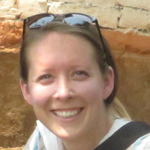 Ashlei Laing, Class of 2014
Ashlei Laing, Class of 2014
Practicum Summary: Designing the landscape of human livelihoods through the regenerative and healing educational methodologies of Permaculture
Ashlei’s research was conducted through a pilot project designed for an Italian Agriturismo community, or a collection of small family farms, in the Italian province of Grosseto in Tuscany, Italy. The objective of the project was to examine the possibilities of improving livelihood opportunities in Agriturismo communities through the implementation of regenerative and healing permaculture education programs. The project had three phases: preparation of a Permaculture course, facilitating the course, and follow up data collection on the course. In order to determine how an Italian Agriturismo community will design itself in a permaculture lifestyle to enhance their overall livelihood, Ashlei conducted a case study, a survey, follow up interviews, and site visit experiences after offering a 72 hour course on Permaculture and additional trainings in the community of Grosseto. Ultimately, she discovered that 83% of students thought the course was a positive experience and enjoyed Permaculture, and 67% admitted to lifestyle changes and thought of the course as a catalyst to future endeavors and livelihoods.
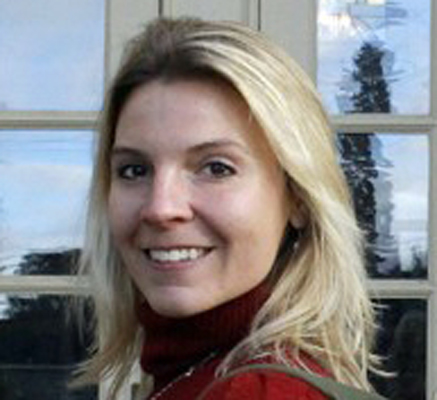 Bethany Garretson, Class of 2014
Bethany Garretson, Class of 2014
Practicum Summary: Genograms to Resources: Wilderness therapy and family dyanmics of at-risk youth
Bethany’s research practicum examines family dynamics of male at-risk adolescents in a New York wilderness therapy program through the creation of genograms. A genogram is created with simple symbols representing gender and lines to illustrate family relationships, which are color-coded with a provided key. In her study, Bethany uses her personal experience as a wilderness therapy guide to interview clients about their family situations, although she changed the names of clients to protect their confidentiality. From the genograms created by participants and follow-up interviews, she found that the overarching characteristics of adolescents considered “at-risk” include the absence of a father figure, a weakened family structure, learning disabilities such as ADHD, lack of self-confidence, academic troubles, overcompensation by mothers, and drug use. The absence of a father in an adolescent’s daily life is often caused by overworking, divorce, and death. Additionally, Bethany found that adopted children often struggle in understanding their situation, and in return develop unproductive coping habits. In order to improve the effectiveness of wilderness therapy programs in the United States, Bethany suggests eliminating unwilling escort services, taking on a more holistic family healing approach, and allowing participants to come to their program on their own, as a mutual decision between the parent and child.
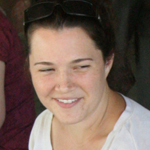 Meaghan Gruber, Class of 2014
Meaghan Gruber, Class of 2014
Practicum Summary: Community Voice in a Multi-Stakeholder Decision Making Process for a Proposed Health Clinic Project in Horminguero, Siuna, Nicaragua
Meaghan’s study focused on the community of Hormiguero in Siuna, Nicaragua and examined the local Collaborative Health Care Clinic Casa Materna’s role in complex multi-stakeholder processes. Through various tools such as observations, consultations, semi-structured interviews, Meaghan analyzed the participation of stakeholders that live in the USA, Siuna, and the community of Hormiguero. She found that although stakeholders with power, such as NGOs, government officials, and businesses, may consult communities on their needs, these organizations who have funding and therefore power, often fail to involve community members in decision-making processes. Meaghan points out that communities are best positioned to determine how their community functions or does not function, their history, and how to achieve goals together. In her conclusion, Meaghan discusses the importance of the three-way partnership and the interplay of different sets of power characteristics that each player contributes to the success of a project, and how these partners can better serve the needs of the community through effective collaboration.
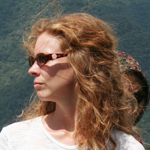 Wendy Reese, Class of 2009
Wendy Reese, Class of 2009
Practicum Summary: Fighting for Survival: Healing the trauma of a broken community through capacity building in Nuestro Barrio, Phoenix, AZ
Reese’s research examines the process of social change and healing in a low-income, primarily Hispanic community in a Voluntary Acquisition and Relocation Sound Mitigation program (VARS) implemented by Sky Harbor Airport and the City of Phoenix. The VARS program offered relocation opportunities for those affected by aircraft noise in the Nuestro Barrio neighborhood adjacent to Sky Harbor Airport. The study explores how residents who chose not to participate in the VARS program and remain in their neighborhood improved the quality of life within their community. Reese uses her experience as a nonresident, societal action science researcher to address how structural violence, or constraints placed on human potential due to economic and political structures, is affected by capacity building, community mobilization, trauma healing, and the development of community partnerships.
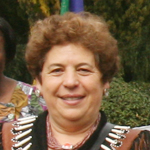 Ellen Lampert, Class of 2007
Ellen Lampert, Class of 2007
Practicum Summary: Seeking Opportunties for Positive Change on the New Mexico Border
Ellen Lampert’s research practicum examines cross-border state and local policy in the context of federal directives in New Mexico, specifically the border situation and those who determine the policy that affects the situation. To carry out her study, she first studied the history of the situation and identified contributing factors such as historical trends and racist rhetoric. She then described the existing situation in terms of recent developments that included a rush to increase border security in the aftermath of international terrorism, socioeconomic disparities that drive Mexican economic migration, drug and human smuggling, paramilitary vigilantism, the border wall mandate, Congressional representation, and unrealistic or conflicting policy. Lampert’s final step in her research is to explore the possibilities for defusing or halting negative rhetoric being encouraged at the federal level that has adverse effects on the state and local community and the way that policy-implementing groups and individuals can work towards a plan for positive resolution. Lampert concludes that the primary problem regarding the decision to build a wall is failure to discuss adequately what the border region should look like in the future. In order to improve relations between the New Mexican community and the US Government, there should be an officially agreed upon vision and strategic plan, constructive dialogue, joint infrastructure projects, and good academic, trade, and labor relations, which will be more mutually beneficial than a wall with armed troops.

